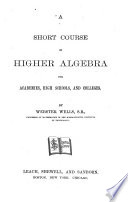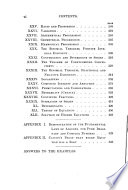 | Webster Wells - Algebra - 1889 - 584 pages
...(Art. 473). Hence, if the roots of a complete equation are all real, the number of positive roots is equal to the number of variations, and the number...negative roots is equal to the number of permanences. An equation whose terms are all positive can have no positive root. 497. 1. Determine the nature of... | |
 | Webster Wells - Algebra - 1890 - 560 pages
...(Art. 633). Hence, if the roots of a complete equation are all real, the number of positive roots is equal to the number of variations, and the number...negative roots is equal to the number of permanences. An equation whose terms are all positive can have no positive root ; and a complete equation whose... | |
 | William Snow Burnside, Arthur William Panton - Determinants - 1899 - 308 pages
.../(— x). 7. When an equation is complete ; if all its roots be real, the number of positive roots is equal to the number of variations, and the number of negative roots is equal to the number of continuations of sign. 8. An equation having an even number of variations of sign must have its last... | |
| |